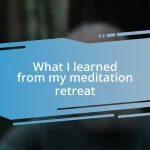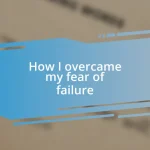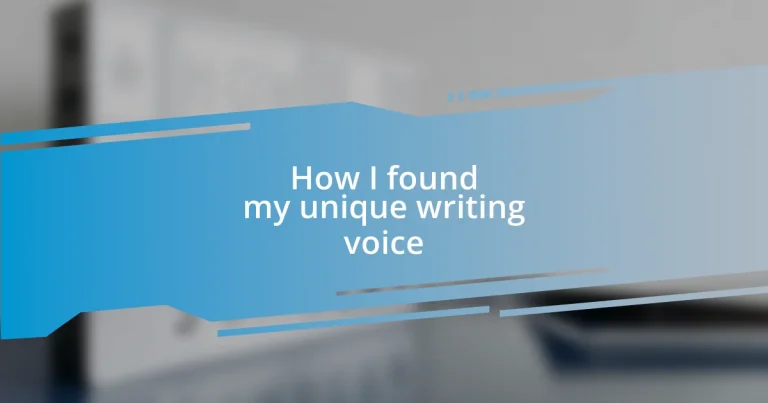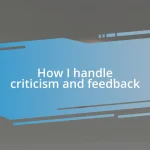Key takeaways:
- Finding your unique writing voice involves embracing authenticity, vulnerability, and personal experiences rather than mimicking others.
- Identifying and reflecting on writing influences allows authors to merge their favorite elements with their own style, fostering a distinctive voice.
- Regular practice, openness to feedback, and patience are essential in refining and developing your writing voice over time.
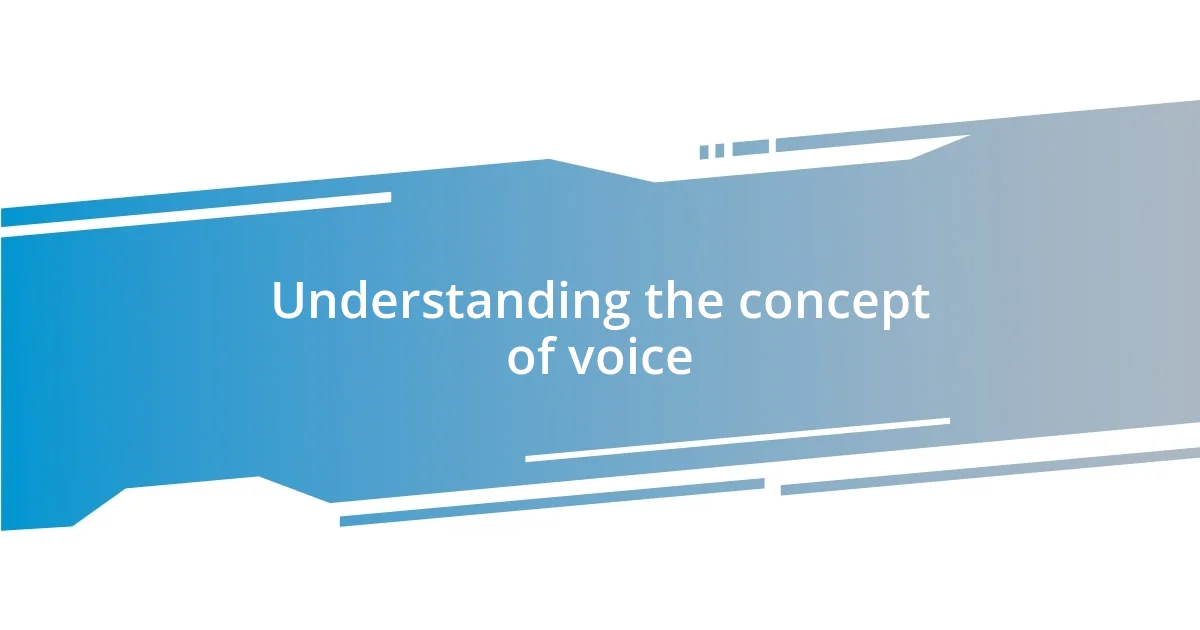
Understanding the concept of voice
Voice in writing is that special quality that reflects who you are as a writer, shaping how you connect with your audience. I remember when I first began writing, I struggled to find my voice, feeling like I was mimicking the styles of authors I admired. It’s a common challenge: how do you balance inspiration from others while still allowing your unique perspective to shine through?
As I experimented with different styles, I found that my voice emerged more clearly when I wrote about topics I was passionate about. For instance, sharing my travel experiences felt effortless, as the emotions and stories poured out naturally. This made me realize that voice is not just about word choice; it’s deeply tied to your interests and feelings—almost like the rhythm of your heartbeat in your writing.
Often, I wonder how many writers feel the pressure to conform to certain norms or trends. I used to feel that way too, but I’ve learned that embracing my quirks and imperfections enhances my voice. It’s in those authentic moments—like laughing at my own silly mistakes or sharing intimate thoughts—that my writing feels most alive and relatable. So, what if you let yourself be vulnerable and true to your experiences?

Identifying your writing influences
Identifying your writing influences is an essential step in crafting your unique voice. Throughout my writing journey, I’ve often reflected on the authors who inspired me most. There’s a certain thrill in dissecting their techniques—how they use rhythm, pacing, and imagery. For example, I used to admire the lyrical prose of poets, and while I don’t write poetry, I borrow their attention to language, which subtly seeps into my narratives.
Recognizing my influences wasn’t a straightforward process. At first, it felt like I was simply copying their styles, but I learned to appreciate them in a different light. I remember a moment of clarity while reading a memoir that resonated deeply with my own life experiences. I realized that while I admired the author’s confessional tone, my stories had a different flavor. By acknowledging their impact, I learned to merge their stylistic elements with my perspective, creating something uniquely mine.
As I engaged with various voices in literature, I found it helpful to maintain a list of those who resonated with me. I still do this today! Compiling this list encourages introspection: why do I connect with certain writers? Is it their authenticity, humor, or perhaps the topics they tackle? It has been rewarding to see how these influences shape my writing, allowing me to carve out a space that feels genuinely reflective of who I am.
| Writer | Influence on Me |
|---|---|
| Ernest Hemingway | Clear, concise prose that inspires brevity in my writing. |
| Virginia Woolf | Stream-of-consciousness technique that encourages emotional depth. |
| Chimamanda Ngozi Adichie | Powerful storytelling that ignites a passion for narrative in my own work. |
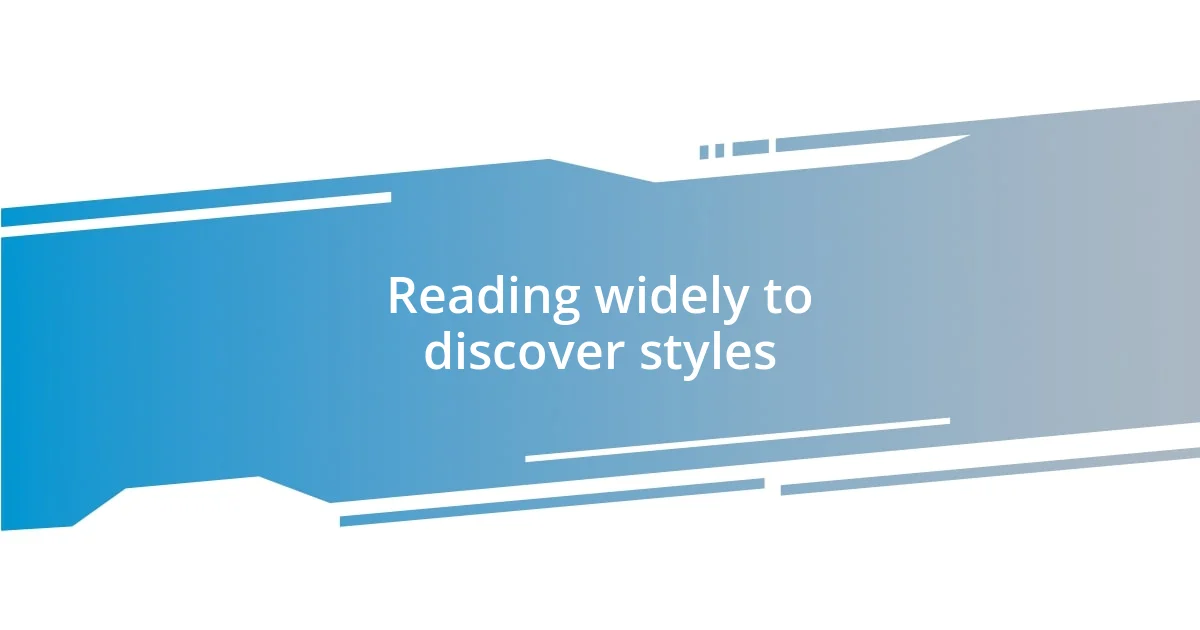
Reading widely to discover styles
Diving into a wide array of reading materials can be an eye-opening journey. I vividly remember the first time I read a graphic novel; the combination of visuals and text was like a light bulb going off in my head. It made me think about how different formats and styles can convey emotions in ways traditional prose might not capture. That experience taught me that exploring diverse literary forms can help expand my writer’s toolbox.
Here are some styles that I found particularly impactful during my reading journey:
- Minimalist Prose: Reading writers like Hemingway taught me the power of simplicity.
- Magical Realism: Gabriel García Márquez opened up my imagination to blending the fantastical with the ordinary.
- Epistolary Novels: Books told through letters or diaries, like “The Perks of Being a Wallflower,” helped me appreciate intimacy in storytelling.
As I continued to read broadly, I couldn’t help but notice how other authors approached their craft. I took a biography of a renowned journalist and the way they crafted narratives from interviews was intriguing. It made me reflect on my interviewing techniques in nonfiction writing. The more I engaged with various authors, the more I could pinpoint nuances in style that resonated with me and made me question my own practices.
My notes became a hodgepodge of ideas, techniques, and unique phrases that struck a chord—little gems to pull from whenever I felt stuck. For instance, one day when I reread a passage from Zadie Smith, the way she blended humor and gravitas inspired me to weave more of myself into my writing. What I found was that the more I read, the more layers I could add to my voice, making it richer and more complex.
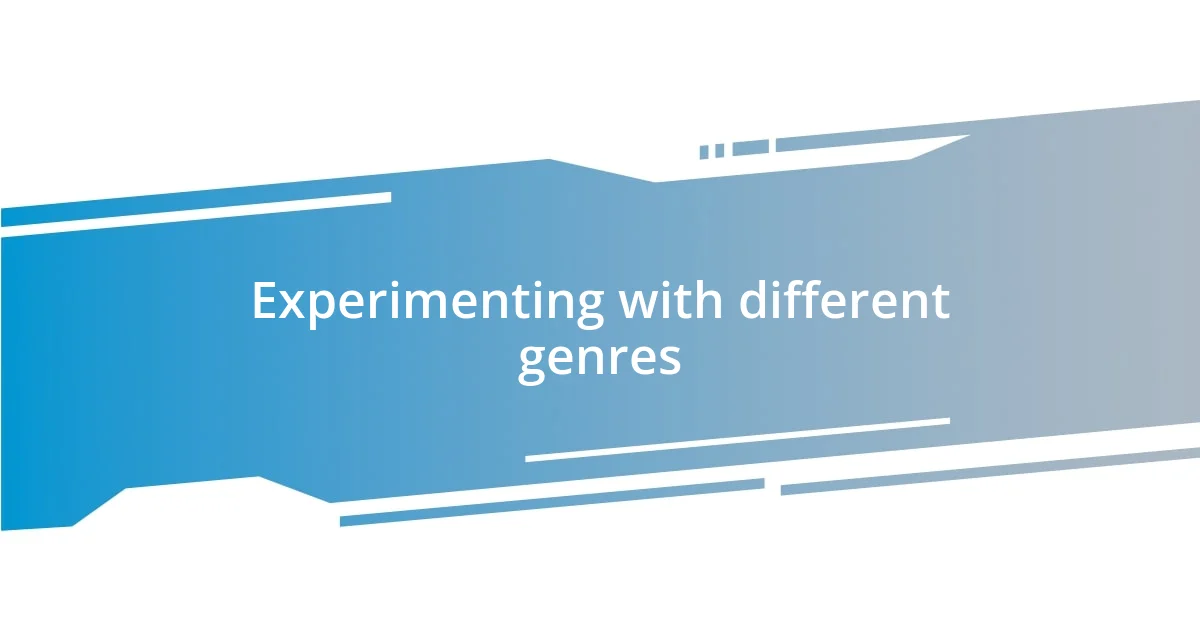
Experimenting with different genres
Experimenting with different genres has been a fascinating part of my writing journey. When I first dipped my toes into writing sci-fi, it felt like stepping into another world. Imagining futuristic settings sparked my creativity in ways I never expected. I often found myself pondering: How do genre conventions shape a narrative? Embracing different genres taught me that each has its own rhythm and unique storytelling mechanisms.
One memorable experience was when I tried my hand at writing a children’s story. It was a delightful challenge to simplify my language while still conveying meaningful lessons. I recall sitting at my kitchen table, surrounded by colorful crayons and a stack of blank paper. The innocence of childhood themes inspired me to reflect on my own experiences growing up. This process made me realize that, regardless of genre, the core of storytelling is emotional connection.
I’ve also experimented with combining genres, like mixing elements of romance with mystery. This blend allowed me to explore new character dynamics and plot twists. Each experiment, whether successful or not, fueled my desire to find what resonates with me. Why do I write? To capture the complexities of life in all its forms, and testing various genres brought me closer to articulating my unique voice.
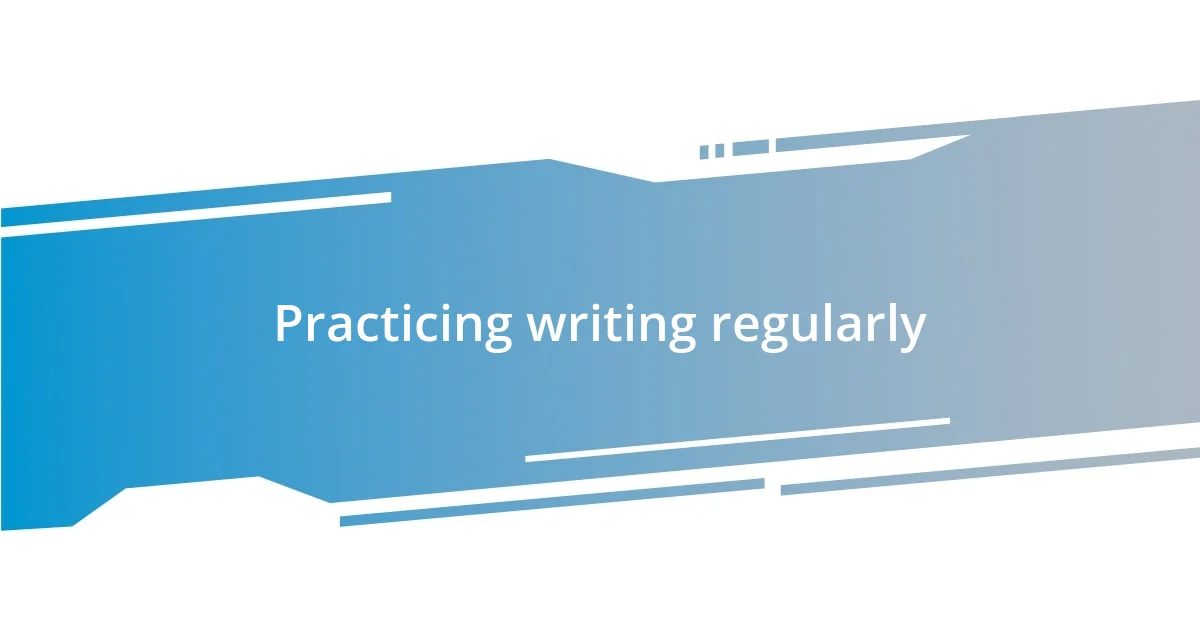
Practicing writing regularly
Practicing writing regularly has been a transformative experience for me. I remember a particularly grueling week when I set a goal to write something—anything—every day, regardless of how I felt. It was on day three that I unexpectedly found a poetic flow in my prose. That moment taught me that consistency often breeds creativity; pushing through those initial blocks can uncover hidden gems in my writing.
There were times when I felt frustrated with my progress. I could hear that nagging voice in my head questioning my abilities. One evening, I committed to a writing prompt that challenged me to describe a mundane object in vivid detail. As I focused intently on a simple coffee cup, I discovered new ways to articulate my thoughts. This exercise not only improved my descriptive skills but also rekindled my passion for everyday moments. Have you ever felt stuck? I think we all have. But it’s those moments of discomfort that often lead to breakthroughs.
I’ve found that variety in my writing practice keeps me motivated. For instance, I often switch between journaling, creative writing, and even social media posts, embracing each form’s unique rhythm. Recently, I participated in a 30-day writing challenge with a group of fellow writers. Sharing my work and receiving feedback felt like a breath of fresh air, reminding me of the value of community. It reinforced my belief that regular practice isn’t just about honing skills—it’s also about building connections and gaining fresh perspectives. Ultimately, the routine of regular writing has become my trusted companion in crafting my unique voice.
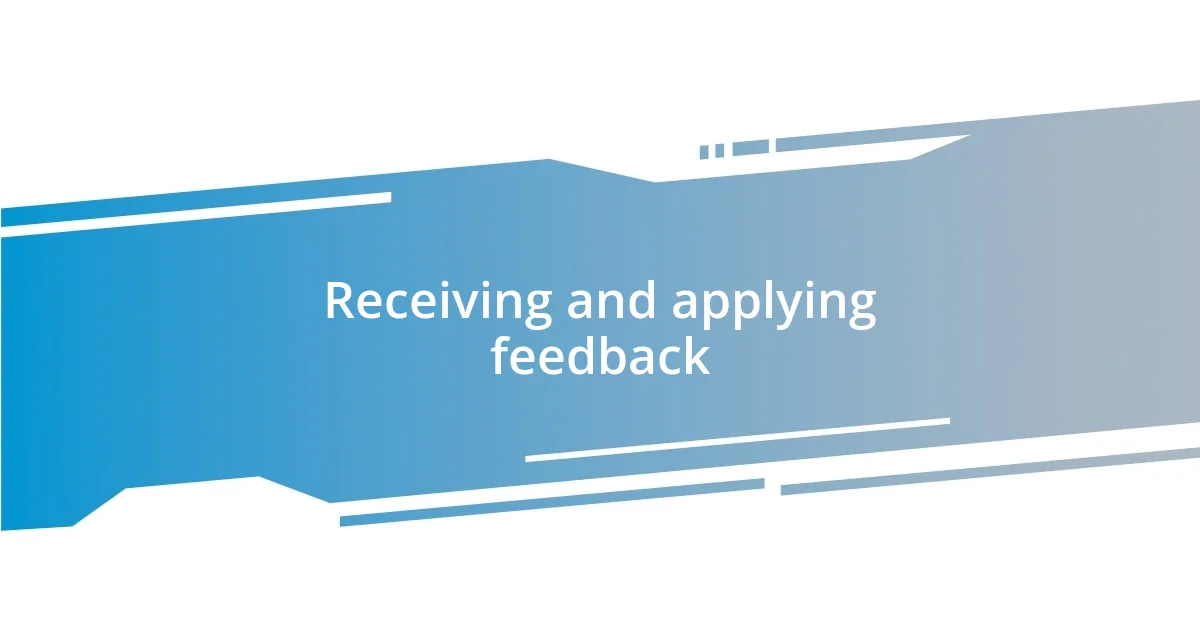
Receiving and applying feedback
Receiving feedback has always been a double-edged sword for me. I recall a time when I submitted my short story to a writing group and anxiously awaited their thoughts. When the reviews came in, I found a mix of encouragement and constructive criticism. Initially, I felt defensive; after all, it was a piece I had poured my heart into. But then I recognized that each suggestion was a stepping stone to refining my voice, not a personal attack. Have you ever faced feedback that stung at first but later felt like a gift? Embracing that perspective changed my approach to criticism—now, I see it as an opportunity for growth.
Applying feedback isn’t just about making changes to my work; it’s also a learning experience. I distinctly remember incorporating feedback about pacing from a trusted mentor. After reworking that section, I was amazed at how it transformed the story’s tension. It made me realize that feedback can illuminate blind spots in my writing. Have you felt the rush of discovery when a small tweak unlocks a deeper connection to your readers? It’s akin to finding a missing puzzle piece that completes the picture.
I also learned that ongoing conversations about my writing are crucial. When I share new drafts with my close friends or fellow writers, their perspectives often provide insights that I hadn’t considered. One friend once pointed out that I tended to overuse certain phrases, which I had been blissfully unaware of. I remember feeling a bit embarrassed, but recognizing this pattern allowed me to diversify my expressions. The camaraderie we build through this exchange not only enriches my writing but reinforces the idea that feedback is most effective when it’s a shared journey. How has your experience been with feedback? I’m sure it’s taught us all valuable lessons along the way.

Refining your voice over time
Refining my writing voice has been an evolving journey, shaped by my experiences and insights over time. I remember the moment I realized my writing lacked authenticity; I was trying too hard to sound like others. After a particularly eye-opening workshop, I decided to experiment with writing in a completely different style—one that felt more natural to me. This leap of faith bore fruit as I began uncovering parts of my voice that had been buried under the weight of imitation. Have you ever felt the urge to mimic writers you admire, only to realize that your uniqueness lies in embracing your individuality?
As I progressed, I noticed that the topics I chose often reflected my interests and emotions. There was a time when I focused solely on popular themes, hoping to attract readers. It wasn’t until I wrote a deeply personal essay about loss that I truly connected with others. The responses I received were overwhelming, revealing that vulnerability resonates more than I could have imagined. It made me reflect: are we sometimes afraid to share our authentic stories for fear of judgment? That experience taught me that it’s this honest sharing, rather than pandering to trends, that truly refines one’s voice.
Over the years, I’ve come to appreciate the role of patience in the refining process. I distinctly recall a time I revisited an old piece of writing, initially cringing at its clumsiness. However, as I read through my words, I realized how much I had grown since then. It was a reminder that refining my voice doesn’t happen overnight. Instead, it’s a continuous dance of stumbling, learning, and evolving. How do you nurture your writing voice amid the ups and downs? I think it’s this ongoing commitment to growth that ultimately leads to the most rewarding discoveries.
